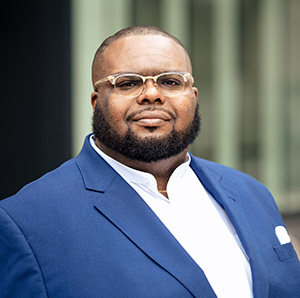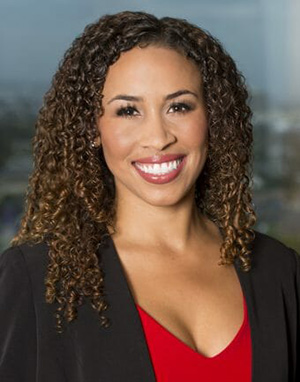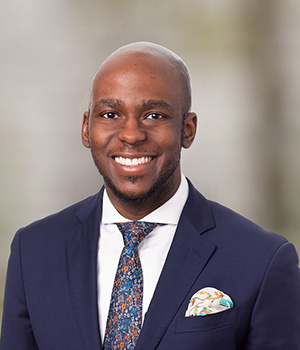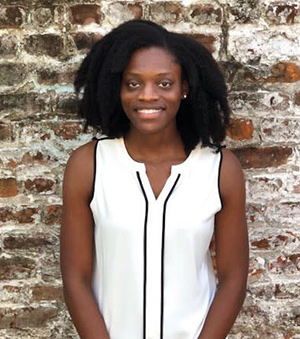By Andrew Cohen
It’s a growing complaint in higher education: While many schools have ramped up recruiting to improve student diversity, that effort often fades when it comes to actively supporting people of color, first-generation professionals, and other underrepresented groups once they actually enroll.
But as four alumni thriving across the legal landscape describe below, Law Students of African Descent (LSAD) is a welcome haven at Berkeley Law — one that strengthened their sense of confidence, community, and resolve.
Antonio L. Ingram II ’14
Assistant Counsel, NAACP Legal Defense Fund, Washington, D.C.

Ingram was still a senior at Yale when LSAD reached out after he was accepted at Berkeley Law. Multiple members hosted him during Admitted Students Weekend, introduced him to the school’s academic and social life, and brought him to the organization’s annual gala.
“I met LSAD students and alumni who were working at some of the most well-regarded firms and nonprofits and clerking for some of the most distinguished judges,” Ingram recalls. “These Black law students and lawyers showed us that if they could do it, we could do it too. It was the type of racial solidarity and support that I especially needed as a first-generation professional from a working-class background.”
Noting that LSAD’s 2Ls and 3Ls host academic retreats where they share class outlines and offer advice on exams, he adds they also mentor younger members on post-graduate employment as well as host meals and social events — and that 1Ls help run LSAD graduation for 3Ls, LL.M. students, and their families.
“LSAD provided the Black community with a sense of belonging in every sense of the word,” he says, “especially knowing that we’d be entering a profession where the type of community LSAD represented would be far and few between.”
Ingram has worked in Malawi through a Public Policy Fulbright Award, in federal judicial clerkships, at international law firms, and now for a storied national nonprofit. He currently litigates cases mainly involving voting rights or educational equity in the South and recently prevailed in a two-week federal trial against the South Carolina General Assembly, alleging it drew redistricting maps that discriminated against Black voters.
With California’s Proposition 209 banning the use of race in admission decisions, Ingram says Black students who get into Berkeley Law often also gain admission to other top schools — but that LSAD sways many of them to choose Berkeley. “They know they’ll get a world-class legal education and have a supportive community along the way,” he says.
Allina Amuchie ’13
Partner, Rutan & Tucker, Irvine, California

LSAD also rolled out the red carpet for Amuchie, offering to host her and subsidize her Admitted Student Weekend travel expenses. She attended a networking barbecue and received the organization’s email list with names, undergraduate institutions, legal interests, school activities, hobbies, and why they chose Berkeley Law.
As a 1L, Amuchie joined the LSAD Trial Team with Jerome Price ’11, Keydon Levy ’11, and Mellori Lumpkin ’12, which won the Thurgood Marshall Mock Trial Competition’s western regional in Las Vegas and competed at the national finals in Houston.
“I received profound guidance from my LSAD Trial Team and really learned how to craft my skills,” Amuchie says. “They served as building blocks that enabled me to excel on the Berkeley Law Trial Team through the Board of Advocates for my 2L and 3L years. Now, as a business litigation partner, I utilize those skill sets in the courtroom.”
Crafting business litigation strategies and steering collaboration with clients, colleagues, and experts, Amuchie largely credits LSAD for helping instill the confidence to do just that.
“It was a source of inspiration and very important in making me feel supported as a person of color at Berkeley Law,” she says. “It was my gateway to learn about the trial teams, classes, SLPS (Student-Initiated Legal Services Projects), and extracurricular activities, and I turned to LSAD members for advice throughout law school. My experience would be very different if I didn’t have their welcoming support.”
Honing job interview skills, developing career opportunities, and building community while shedding stress during movie nights, annual Tahoe trips, social events, and simply popping into the group’s office between classes, Amuchie says her first-year experience was so formative that she “felt compelled to help the next incoming class” and co-chaired LSAD as a 2L.
Tyler Garvey ’14
Vice President & Counsel, BNP Paribas, New York City

For Garvey, coming 3,000 miles away from New York, speaking to LSAD members before attending Berkeley Law was paramount and helped influence his decision to enroll.
“LSAD was my home outside of home … a place to meet folks with similar backgrounds,” he says. “My best memories were us having bowling events and holiday dinners. We were such a tight-knit group.”
A former project finance attorney at White & Case, Garvey has expanded his work on capital market transactions and securitizations at BNP Paribas, an international banking company with a presence in 65 countries. He often oversees external counsel on such transactions, enabling him to stay close to the deal action while taking on different management roles.
The versatility and agility his job requires sometimes evokes fond memories of law school.
“I think one thing that defines LSAD is the hustle that’s inherent within the group,” Garvey says. “Anytime we needed to do something as an organization, everyone jumped in to lend a helping hand.”
Calling the group an “important supplement” for Berkeley Law’s students of color, he explains that many are the first in their families to attend law school and that as a result, certain aspects of their law school experience are entirely foreign.
“LSAD was a place where I shared outlines and had deep and real conversations with people who are still my friends today,” Garvey says. “It was a place to get advice and prepare you not just for law school, but for life after law school.”
Shanita Farris ’16
Assistant Federal Public Defender, District of Arizona, Phoenix

It didn’t take Farris long to build a strong connection to LSAD.
“My first impression was that they were all very welcoming and down-to-earth people,” she says. “They were also very active in the Berkeley Law community, which made me excited to soon join the organization and school.”
As a student, Farris provided legal help for marginalized populations and individuals within the school’s International Human Rights Law Clinic, East Bay Community Law Center, and Death Penalty Clinic. She has continued that pursuit, full throttle, since graduating.
Farris spent six years as an attorney at the Capital Appeals Project, working on Louisiana state appeals representing both people sentenced to death and juveniles sentenced to life without parole. During that time, she also worked as an adjunct professor at Loyola University New Orleans College of Law.
Recently becoming an assistant federal public defender specializing in capital federal habeas cases, Farris is also a committee member on the American Bar Association Death Penalty Due Process Review Project. She fondly remembers how LSAD helped pave her path.
“It improved my law school experience by being a wonderful academic, professional, and social network,” says Farris, the organization’s social events co-chair during her 2L year. “I received textbooks and outlines from members, took part in study groups, and members also supported me when it came to applying to and preparing for interviews for internships and jobs.
“But my fondest memories are from the social events. LSAD was just a great space for me to build community with other Black law students.”